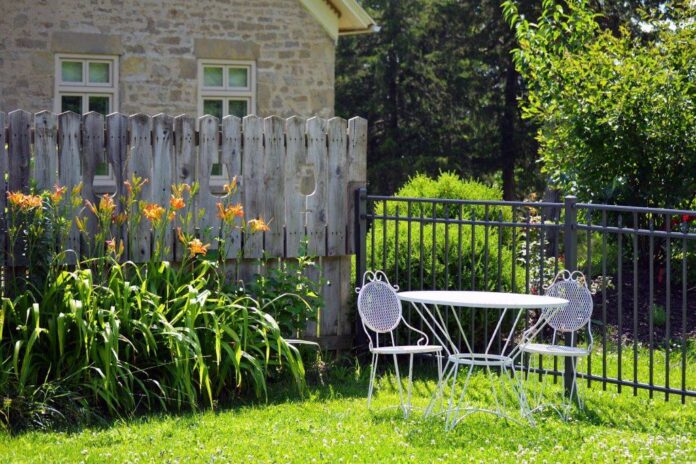It’s great fun to work as both a contractor and a master gardener. While most of my gardens are located in backyards, I do occasionally have to work in the front yard due to the fact that some houses within the property require that the majority of the garden be there. Although you may not realize it, front yard gardens often benefit from privacy, support and protection of fencing. The type of plants can also make a difference in what kind of fence works best in front gardens.
Some front gardens don’t need a fence. Others look better with a hedge or row of plants. Beautiful gardens can also be created with a brick wall or stone wall around the garden or front yard. There are times when fences can be both practical and beautiful. We will discuss the reasons you might want to fence your garden, and which type of fence is best.
Why use Fencing in the Front Garden
The decision to put a fence around your front garden is mostly subjective. However, I believe you can’t go wrong with a fence that matches your home. A fence might be something you want to consider if you are looking for any of these benefits.
Protecting plants: A garden fence can be used to prevent people and animals from causing damage to plants or beds. Although smaller fences and edgings can deter small animals, they are not as effective at keeping large animals away from delicate plants. A taller barrier is better for larger animals and humans.
Privacy: Some people find gardening and time spent in the garden a sacred and meditative way to relax, disconnect from the hustle and bustle of life, and connect with something deeper and more important. This may require privacy. Some people prefer a picket fence and rail, while others need a more opaque barrier.
The Space Frame: Some people like to let their garden sprawl onto the sidewalk. However, I have found that most people prefer clear boundaries between their private space, and the public right-of-way. A formal fence is better for formal gardens, and a more exuberant plant can be matched with a formal fence.
What Qualities Are You Looking For in Front Garden Fencing?
A garden fence should have ample sunlight access, especially if it is used for growing vegetables and fruits. Sun-loving vegetables need to have as much sunlight as possible during the first stages of their lives and throughout the year.
Low maintenance and long-lasting quality are the second qualities I look for when choosing a fence. If I have a large garden that runs right up to the fence I don’t want it to need to be removed every few years or pressure washed and sealed every year. It is important to choose a fence that will look great and lasts even if it isn’t.
Fencing Types for the Garden
There are many styles and types of fencing that can be used to protect a flower or vegetable garden.
Wood: Wooden fencing is great for privacy and allows in lots of light. If there are shade trees or the fence is designed to block sunlight from an area, fencing that lets in more light can be beneficial. This is where a wooden frame with a steel screen between it and steel cables would be a better choice. Although wood is a great material to work with, it can be difficult to maintain a fence next to dense plants. This is especially true with the need for recurring cleaning, sanding and sealing. The main problem with wood is its inability to withstand the elements for as long as possible.
Steel: Steel fencing offers clean lines that enhance a garden’s aesthetic appeal while allowing plenty of light through. Steel is a good choice for complementing formal spaces and providing formal lines for exuberant plants. Steel is easy to clean due to its smooth surface. Iron fences and steel have always had rust as their biggest weakness. Older picket or rail fences were prone to rusting from moisture. This can lead to rusty paint, deterioration and even chipping. However, this is not the end of the story. There is at least one company that makes steel fences that are extremely well protected with several protective coatings. These fences are durable and can withstand harsh environments. They also make the best fences in wet areas.
Vinyl: Vinyl is a popular choice due to its low cost and easy installation. Vinyl isn’t very durable. Vinyl is susceptible to scratches and dents, fasteners can rust the fence posts’ faces, and it will eventually fade in colour. Vinyl is available in many styles and colours. However, it has a shiny, plastic appearance that I think makes it better for the back yard than the front.
Although fencing materials can be chosen based on personal preference, I prefer the classic, steel fencing. Practically speaking, if a property needs as much light as possible, and my clients don’t want the enclosed feeling that wooden security fencing brings, I prefer a steel rail or picket fence. They are beautiful and easy to maintain. Fortress Building Products produce some of the finest. They have used a sophisticated combination of protective coatings including an auto industry-derived e-coat to prevent under bodies from rusting.









